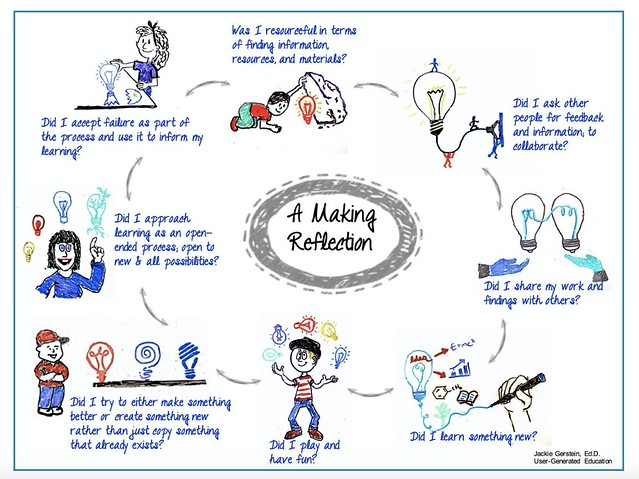“We do not learn from experience, we learn from reflecting on experience.” John Dewey, quoted in User Generated Education blog by Jackie Gerstein, 5th October, 2015.
This week, we have been asked to think of a time, during our student lives, where something did not quite go as planned, or the outcome was not quite as desired. By using the steps in Gerstein’s flow chart, we should review the situation and answer each step individually, for sharing with the group (or beyond, with this blog).

A Making Reflection, Jackie Gerstein.
One of the most challenging assignments so far (for me) would be last year’s Business Plan. Ideally, this crucial assignment, completed via the guidance of online lecture notes and a blank template, would be scheduled towards the end of the one year Diploma course in Remedial Massage. Due to several unforeseen circumstances (and not even counting the new unforeseen circumstances of this year, ie. the current world pandemic, which has required that more subjects be reshuffled), we had to complete this assignment early. I was aware that, in a real-world situation, several of the elements of a Business Plan would be devised with the paid consultations with experts, and at times, I did find that going it alone was intimidating. However, I did survive!
Was I resourceful…?
For the Business Plan, when an aspect was causing me to feel indecisive, or in need of further information, I did a lot of Internet searches, used college resources (including a consultation with the lecturer at one perplexing point) and lecture notes.
Did I ask others…?
I also sought assistance from five different friends/contacts, making sure I directed specific questions in their realm of expertise. Their feedback was essential. This did require starting the assignment early enough, which I managed to do, to account for the extra time needed to field phone calls, set up meetings and collaborate on how to present aspects in the template. The assignment would certainly have been more stressful if I had left it until the week it was due.
Did I share…?
As a result of some of my discussions with my friends/contacts and the lecturer, I did offer advice to my fellow students on how I approached calculations used in the Business Plan. Of course, their answers would end up being very different, since we were all describing different business models in our plans.
Did I learn…?
I definitely felt like I learned lots of new things. Certain parts of the Business Plan were familiar to me, due to past experiences, such as: analysing the content and design of websites of the rival, local businesses; aspects of Work Health and Safety; and designing a meaningful, appealing business logo. New aspects included: determining market targets; estimating Profit & Loss; and laying out and interpreting a Financial Summary.
Did I play and have fun…?
While completing this assignment was very daunting, I found that really enjoyed comparing and analysing the local competitors and evolving my own logo.
Did I try to create…?
As much as I searched for existing sample Business Plans online, the uniqueness of my situation meant that the final assignment was uniquely mine, and wasn’t going to be valid if I tried to pass off an existing Business Plan as mine.
Did I approach learning as an open-ended process…?
The responses from my various contacts led me into areas I had not previously considered. Similarly, analysing the websites, shopfronts and services of my existing competitors, and the unique makeup of my local area’s residents needs (such as the large number of new nursing homes in Penrith), provided insights into very real gaps in the market that I had not previously considered.
Did I accept failure…?
I almost started the diagram’s cycle here, as the mere mention of “failure” can seem a bit negative – but since I know I passed the assignment, I obviously did not fail. Acceptance of the possibility of failure is always worth keeping in mind. It is the key attitudinal part of the process and I do typically use possibility of failure to inform my learning. Most educational institutions also offer a pathway to convert a failed assignment into a pass, but ideally it will be couched with feedback from the marker, further reading, discussions with the lecturer, etc.
I think the only (rare) times I have admitted defeat in my past – and walked away from an unfinished project – there has been some complicated political situation, in which I have felt that others in power were taking advantage of my efforts and motivations. Sometimes, for mental health reasons, walking away from a difficult project/situation can be… therapeutic.
